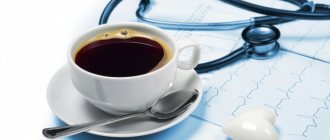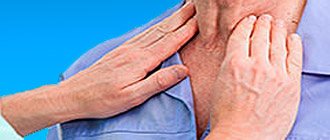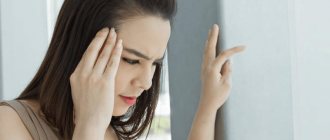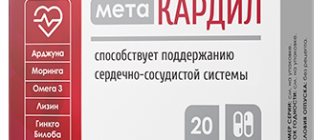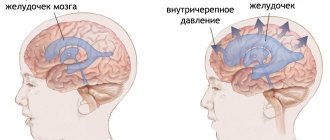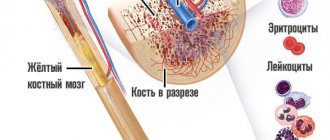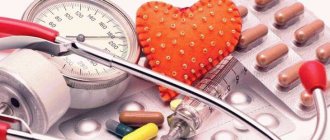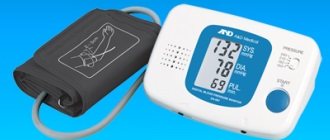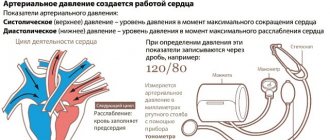With hypertension, most physiological processes are disrupted, so during night sleep the pressure level can increase significantly. This reaction is a poor diagnostic criterion, since it signals a disorder in the parasympathetic nervous system, increasing the risk of developing cardiac pathologies, including myocardial infarction. Isolated increases in blood pressure at night present great challenges, as they are difficult to diagnose and treat. When identifying problems with nighttime blood pressure, patients should find out why blood pressure rises at night and what diseases lead to this disorder.
Causes of nocturnal hypertension
Only the person himself can accurately answer the question of why pressure begins to rise at night, since he knows what could have provoked an increase in vascular tone throughout the day, and therefore a possible jump.
Normally, the vagus nerve, a representative of the parasympathetic nervous system, is responsible for vascular tone at night. It ensures the stability of the physiological blood pressure cycle. A variety of reasons can lead to abnormal vasospasm.
Age
Increased blood pressure is not a natural result of aging. But age-related changes in the vascular wall (loss of elasticity, impaired renal function, calcification, sclerosis, atherosclerotic plaques, decreased ability of receptors to respond to changes, insufficient nutrition, oxygen supply to tissues) contribute to the development of hypertension, including nocturnal hypertension.
Particularly characteristic of age-related hypertension is a sharp increase in the systolic (cardiac) indicator at night, which is explained by persistent vasospasm as a result of wear and tear of the vasodilator mechanisms of arterial balance when the renin-aldosterone system is activated.
Therefore, older people have evening quarrels with loved ones, playing sports before bed, smoking, watching movies with loud music, reading past midnight, electronic gadgets, salty or sweet foods at night, alcohol, drinking a lot of water, changing climate or time zone (vacation). , business trips), night shift work - always provoke nocturnal hypertension with unpredictable consequences. After 45, a healthy lifestyle and giving up bad habits literally prolong life.
Apnea
An increase in pressure at night can be the result of a short-term cessation of breathing - apnea. The oxygen content in the blood drops: from 95% to 65% in just one minute. Hypoxia is perceived by the body as a stressful situation. All compensatory mechanisms are activated: the adrenal glands release hormones into the blood, cardiac output increases, arteries spasm, and the process of night rehabilitation is blocked.
In the morning, patients are irritable, they want to sleep, and they feel arrhythmia. In this case, the maximum high pressure occurs precisely at night and in the morning, but high blood pressure numbers are recorded throughout the day. The peculiarity is that the diastolic indicator increases predominantly, and conventional antihypertensive therapy has almost no effect. The situation may turn out to be critical, leading to cardiac arrest or death.
Nephropathy
Blood pressure increases at night with nephropathy. This is explained by the release of a large amount of renin into the blood, which triggers a complex chain of biochemical processes leading to hypertension.
Biologically active substances in the bloodstream cause generalized vasospasm and retain water and sodium. This is most often observed in diabetic nephropathy, which can be detected in the early stages if 24-hour blood pressure is regularly monitored. Thus, it is possible to avoid chronic renal failure (manifestations of hypertension are diagnosed before protein appears in the urine).
Panic attacks
Vegetative-vascular dystonia, with a predominance of the sympathetic nervous system, is accompanied by night crises or panic attacks. The mechanism is simple: an intense release of adrenal hormones into the bloodstream. Clinically, there is a sharp awakening, lack of air, profuse sweat, tachycardia, a feeling of anxiety and fear. The condition lasts from 10 to 30 minutes. After finishing, I want to urinate. The next 24 hours leave patients with a feeling of weakness and decreased performance.
- Treatment of hypertension with folk remedies at home
How are hypertension and insomnia related?
Directly. Violation of the rest regime (impossibility of night recovery) occurs when:
- nervous system dysfunction;
- hormonal imbalance;
- incorrect functioning of the hypothalamus;
- overvoltage;
- feeling unwell;
- arrhythmias;
- stress.
In this case, a vicious circle arises: high blood pressure provokes insomnia, and it provokes tachycardia, which again causes hypertension. Lack of sleep leads to a decrease in immunity, the patient begins to suffer from nightmares, migraines, and irritability.
Most often, patients are concerned about the question: why does blood pressure rise only at night, but behave normally during the day? However, taking antihypertensive drugs does not change the situation. This is an important point, for several reasons:
- incorrectly selected dose of medication;
- insufficient frequency of administration;
- incorrect combination of drugs;
- stress during the day;
- mental overstrain due to physical inactivity;
- smoking, drinking large amounts of coffee, alcoholic beverages;
- poor nutrition;
- jet lag due to working at night;
- watching movies, gadgets at night.
It is necessary to consult a doctor and change your medication regimen, which will prevent the risk of developing a heart attack or stroke.
What to do to lower blood pressure?
If you follow these recommendations, the result will be obvious.
If a person's blood pressure rises at night, it is important to seek medical advice first. If the cause of this condition is identified and cured, it will be possible to get rid of this problem along the way. But during treatment, it is important for the patient to do something himself in order to improve the condition. The doctor will advise you to improve your diet, get rid of bad habits, do physical therapy, walk more in the fresh air, and not eat too much before bed.
To monitor blood pressure and pulse at any time of the day, it is worth buying a tonometer, and in the event that a sharp deterioration in the condition occurs, the patient will be able to find out his exact pressure and take appropriate measures. But if your blood pressure does not decrease after taking prescribed medications, you should not expect the problem to solve itself. Call an ambulance immediately, and before it arrives, you should try to calm down and not be nervous.
The importance of diagnostics
Examination for hypertension will help save health, and sometimes life. At home, full monitoring of increased blood pressure levels at night is impossible. However, patients at risk need to measure their blood pressure at home three times a day - when they wake up in the morning, during the day and before going to bed. These figures allow us to determine at what time of day the indicators are highest.
To prescribe adequate treatment, it is necessary to undergo diagnostics in a hospital using the ABPM method - 24-hour blood pressure monitoring. Such an examination most accurately determines nocturnal hypertension, which will allow you to adjust your medication regimen.
Traditional methods
To normalize blood pressure and feel good at any time of the day, it is recommended to use traditional methods that are no less effective than medications. But before use, you should consult your doctor to avoid unwanted complications. A recipe for this herbal infusion will help you adjust your blood pressure. Grind and mix the following herbs in equal proportions: St. John's wort, mint, yarrow, chamomile, lovage. Pour the ingredients into a thermos, pour 1.5 liters of boiling water, and let it brew for 1.5-2 hours. Drink as tea, adding lemon and honey if desired. Regular use of the infusion will have a beneficial effect on the condition of blood vessels and the heart muscle, which will help prevent a hypertensive attack at night.
Hypertension at night
In a healthy person, blood pressure drops during sleep and rises again in the morning. With nocturnal hypertension, there is an increase in blood pressure. This pathology is dangerous because a person does not immediately notice it, and morning sickness after such a jump is attributed to severe fatigue or other reasons.
Causes of the phenomenon
Blood pressure rises at night during sleep due to the following factors:
- Poor nutrition. Consumption of salty and fatty foods, tea, coffee, alcohol before bedtime leads to disruption of the kidneys, the appearance of edema, as a result of which the load on the heart and blood vessels increases.
- Violation of the daily routine. The human biological clock is set to the fact that night is a time of rest and relaxation. Staying awake during this period causes stress to the body, disrupts many processes in it and can raise blood pressure.
- Hormonal disorders. The endocrine function is responsible for metabolism in the body; failures in its functioning are one of the causes of hypertension.
- Diseases of the cardiovascular system. In this case, the pressure can rise both during the day and at night.
- Bad habits. Smoking and drinking alcohol cause vasospasm, leading to hypertension.
Main symptoms and risk group
In the initial stage, a person wakes up at night due to a headache (often in the back of the head) and discomfort in the chest. In the morning he does not feel rested. This condition persists for several days. As the pathology progresses, the following symptoms are added to the existing symptoms:
- Why do my joints hurt at night?
- dyspnea;
- pain in the heart area;
- blurred vision;
- heart problems (angina);
- changes in the vascular pattern of the fundus.
At the third stage, changes occur in vital organs that are considered irreversible. In this case, the increase in pressure during night sleep is characterized by indicators of 180/110 and above. A hypertensive patient with stage 3 has a history of angina pectoris, he constantly feels short of breath and cannot perform simple physical actions, for example, running or climbing a mountain.
It is important to know! At risk are people who like to eat at night, as well as night shift workers and patients with disorders of the heart and nervous system, including vegetative-vascular dystonia and low blood pressure (hypotonics). A hereditary factor can also lead to the disease.
Risks to health and life
Nocturnal hypertensive crisis is a very dangerous condition. In some cases, it leads to the following consequences;
- myocardial infarction;
- stroke;
- death in a dream.
The first degree of pathology in the absence of adequate therapy leads to further disorders, the blood pressure level will only increase, not decrease. The disease affects the quality of life, since the body does not receive proper rest, and this, in the initial stage, is accompanied by a feeling of weakness and fatigue.
Persistent hypertension leads to irreversible dysfunction of the heart, kidneys, and brain, which is accompanied by angina pectoris, decreased hearing and vision, and changes in the elasticity of the vascular walls.
Advice! If you experience any symptoms of increased blood pressure within a few days, you should consult a doctor - a cardiologist or neurologist. If you feel suffocation or headache, call an ambulance immediately!
How to increase blood pressure?
When the pressure drops at night, the patient can drink hot, sweet coffee or tea, but this measure will only bring temporary relief, so you should always have medications with you that are effective in such cases. If blood pressure constantly fluctuates and the patient suffers from hypotension, the doctor will advise you to adjust your sleep and daytime routine, be less nervous, and avoid stressful situations.
Women who are constantly on debilitating diets often suffer from hypotension and pressure surges at night. To have a beautiful body and good health, it is not necessary to give up normal food and eat only lettuce leaves. It is enough to exclude sweets, animal fats, simple carbohydrates and bad habits from your diet. Then your weight will always be within normal limits, and there will be no problems with blood pressure.
If you feel a persistent deterioration in your health at night, call an ambulance immediately, as the situation may have a serious outcome.
Why in the lying position?
There are diseases that few people have heard of. Therefore, people often do not even suspect that they have serious health problems. This is the main argument why blood pressure rises at night when lying down.
One of these diseases is OSA (obstructive sleep apnea syndrome). This is the cessation of pulmonary ventilation for 10 seconds or more. An attack can last 20-30 seconds, and in particularly advanced cases, reach 2-3 minutes and in total reach 60% of sleep time.
Obstructive sleep syndrome at night becomes a regular process when it is preceded by pulmonary apnea during the day with 10-15 repetitions within an hour. The syndrome is accompanied by daytime sleepiness and impaired intellect and memory processes.
Obstructive sleep apnea requires snoring, which accompanies frequent or complete cessation of the respiratory function of the lungs. As a result of gross fragmentation of sleep, the level of carbon dioxide in the blood increases, which explains daytime sleepiness.
The second form of manifestation of obstructive apnea can be called hypopnea. In its phase, complete cessation of breathing does not occur, but it lasts longer and is just as dangerous.
The disease is serious and can interrupt sleep by activating the hypothalamic-pituitary system. There is a change in the activity of the parasympathetic nervous system to the sympathetic one, and it becomes difficult to sleep.
This leads to depressive states, then to heart attacks and strokes, which are preceded by high blood pressure due to hypertension.
Why, if the pressure rises at night precisely in a supine position, is it necessary to urgently consult a doctor? A person with this diagnosis may fall asleep and not wake up.
In this regard, dangerous conditions of apnea and hypopnea require immediate medical attention.
Symptoms
| Pressure | Symptoms |
| Increased | If the pressure rises at night, the patient cannot sleep normally, he is tormented by nightmares and insomnia. Without taking the necessary measures, a severe headache develops over time, which is accompanied by nausea, belching, and an attack of vomiting. Lying on your back can cause an attack of suffocation, so you should be in an elevated state all the time. If your blood pressure often rises at night and becomes unwell, you should immediately seek medical advice. |
| Decreased | With low blood pressure, the head also begins to hurt severely when lying down. It is impossible to sleep, dizziness, chills, extremities become cold, and the skin becomes pale. Vision and hearing are impaired, sometimes the patient cannot navigate where he is. Low blood pressure can cause loss of consciousness, so it is worth monitoring the victim at all times and, if possible, providing first aid. |
Treatment methods for nocturnal hypertension
How to treat nocturnal hypertension depends on the stage of the disease. At the initial stage, lifestyle changes, diuretics (Clopamide, Furosemide) and sedatives of plant origin are sufficient. The main goal is to reduce the load on the blood vessels. Patients should completely review their diet and limit salt intake, especially after lunch. Avoid consuming caffeinated drinks and strong tea.
As a diuretic, you can use a decoction of rose hips, tansy, and mint. Taking sedatives can reduce brain activity and relax the central nervous system, thereby normalizing blood pressure. Alcohol tinctures of peony, valerian, and motherwort improve the natural process of falling asleep.
Drug therapy for stages 2-3 of nocturnal hypertension
Treatment of nocturnal hypertension in the second and third stages is carried out with medications. Shown:
- calcium antagonists (Corinfar, Felodipine) - help improve the condition of the tissues of the vascular walls;
- direct renin inhibitor (Methiopril, Capoten) - reduces the secretion of renin by the kidneys, helps reduce the rate, reduce the volume of circulating plasma;
- beta blocker (Matoprolol, Viske) - affects the receptors, the vessels deflate, weaken, and cease to provide resistance to the periphery.
Medicines that lower blood pressure should be taken schematically.
In each individual case, the duration of use and dosage are determined by the doctor. Independent uncontrolled use of such drugs can cause a crisis. Calcium antagonists should be taken with caution. The medicine has many side effects and can cause swelling of the face, arms, legs, and dizziness.
In addition, B vitamins are prescribed to restore central nervous system cells, and magnesium to normalize heart rate.
Diet
Table No. 10 is recommended for hypertensive patients. The diet allows for consumption:
- any types of vegetable crops, raw, boiled, steamed, stewed;
- fruit salads, fresh juices, smoothies;
- meat, fish and dairy products with reduced fat content;
- whole grain bread made from rye flour, crispbread;
- legumes, mushrooms, cereals;
- It is better to replace sweets with jam, honey, pure sugar (allowed to be consumed in small quantities).
Nocturnal hypertension of 2-3 degrees uses a salt-free diet as an additional measure in treatment. Everything that comes to the table of a hypertensive patient must be carefully checked. Severe swelling can be relieved by reducing your daily water intake.
After suffering a hypertensive crisis, it is better to refuse food for a day. You can eat fruits or vegetables; meat and fish broths are strictly prohibited. Dishes are prepared without salt. Together with the first courses, the daily water consumption rate is 1 liter.
Proper nutrition
If a patient’s blood pressure rises at night while sleeping, the reason may lie in a violation of the diet. Thus, eating fatty and fried foods before bed puts a considerable strain on the gastrointestinal tract and, as a result, increases the level of vascular tone. In addition, overeating causes obesity, which also does not have the best effect on the quality of sleep and blood pressure.
Proper nutrition will help save you from nighttime pressure changes - this is not just introducing the right foods into your diet, but also eating at a certain time. You should avoid snacking, especially before bed. It is optimal to eat according to the principle of fractional meals - often in small portions, and the last meal should be no later than 4 hours before bedtime.
Caffeine and its effects on the body
It is the abuse of caffeine throughout the day and especially in the evening hours, before bedtime, that negatively affects blood pressure levels. The maximum dose of coffee per day for a person is no more than 3 cups, and it is better to drink it before lunch.
Abuse of caffeine more than this norm, or closer to bedtime, can cause heart rhythm disturbances and an increase in the level of tone of the vascular system, insomnia. Therefore, you should not abuse coffee and strong black tea, since it also contains a high caffeine content.
